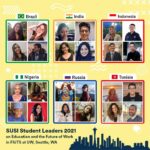To celebrate International Education Day, we are highlighting our many inspiring alumni from our Study of U.S. Institutes (SUSI) for Global Student Leaders program. Through partnerships with five U.S. universities and a series of interactive classroom activities, community-based projects and site visits to U.S. cities of all sizes, SUSI students experience an in-depth investigation into program themes and enhance their understanding of American values. Rishitha Jaladi of India spoke with Meridian’s Center for Global Leadership to reflect on his experience and its impact. Jaladi participated in the Summer 2021 virtual Institute on Youth, Education, and the Future of Work hosted by FIUTS at the University of Washington.
This year’s International Day of Education theme is, “Changing Course, Transforming Education.” How has participating in SUSI transformed your life, career, or education?
Participating in the SUSI exchange program was one of the best decisions of my life. It has helped me to become a better version of myself. For me, learning about education and the future of work with community-based partner FIUTS at the University of Washington was intense and beautiful as it opened my mind to the way I present myself to others, as well as to the way I treat others. I learned that there are no strangers, only friends whom I haven’t met yet. I am happy to be associated with Meridian International Center, FIUTS, and an amazing student group, who are always willing to share their ideas and learn from others.
What was your community action project? What was its educational impact for your community?
I’m working on the community action project “Value-ED”(Value-Education). I believe people see education as the means of climbing the social and economic ladder. If the education system is failing then it is certainly not due to a lack of demand for good education, or because a market for education does not exist. It has more intrinsic reasons — visit any school in India, you will find lots of books in bags and lengthy answers in notebooks. Will this method create responsible students or citizens? Certainly not. The paradigm needs to shift its focus from “captive” to “creative” studies.
Additionally, the lack of value education is predominant. Children from deprived and low-income areas contribute to almost 70% of public schools, however, hardly any learn knowledge and skills to face the real world through school. This has been a community issue for decades and my project aims to create awareness about the importance of value education and skill development in local schools at the most basic level.
How has the COVID-19 pandemic impacted education in your area? How have you given back, or helped build connections or roadmaps for today’s students?
The pandemic has caused widespread school and college closures worldwide, causing considerable disruption to the public education system. It impacted approximately 320 million students in India, making it physically difficult for them to attend school. As a result, the chasm between educational institutions and students is becoming increasingly wider. To fill this gap, I collaborated with the local NGOs and arranged smartphones for students from marginalized communities in my locality. We hired a few teachers who could teach them online on weekends and students embraced online training modules and hybrid learning.
Were there any aspects of the SUSI program that inspired or motivated you? Tell us how you used what you learned to become a better leader or advance collaboration for shared goals?
During SUSI, I learned many new things that I apply in my everyday life. Sessions on SMARTIE goals and various leadership styles were the most thought-provoking. I believe there is never a ready-made formula for becoming an efficient leader but comes from their choices, efforts, and dedication.
I believe that knowing about my leadership styles and what they represent helped me to handle projects better and have the most positive impact.
This differentiates an ordinary leader from an extraordinary one.
What advice would you give the next generation about pursuing education through international exchanges?
My experience as an exchange student was a rollercoaster. I learned that we’re all so different with respect to our cultures, race, colour and languages, yet, we’re so alike in the way we think. I would encourage students to pursue education through international exchanges as it enables them to acquire new skills and learn in a different cultural context.
Why is international education important for creating the qualities of a great leader?
International education is important for creating great leaders as it improves worldview and perspective at an impressionable age. It allows you to look beyond and think, partnering with people all over the world to discuss debate, and re-envision the ways education and technology can reshape our world. If you are a person who believes in continuous learning and personality development along with having fun, student exchange programs can be the best thing.





“Be the change you wish to see in the world”- Mahatma Gandhi
















